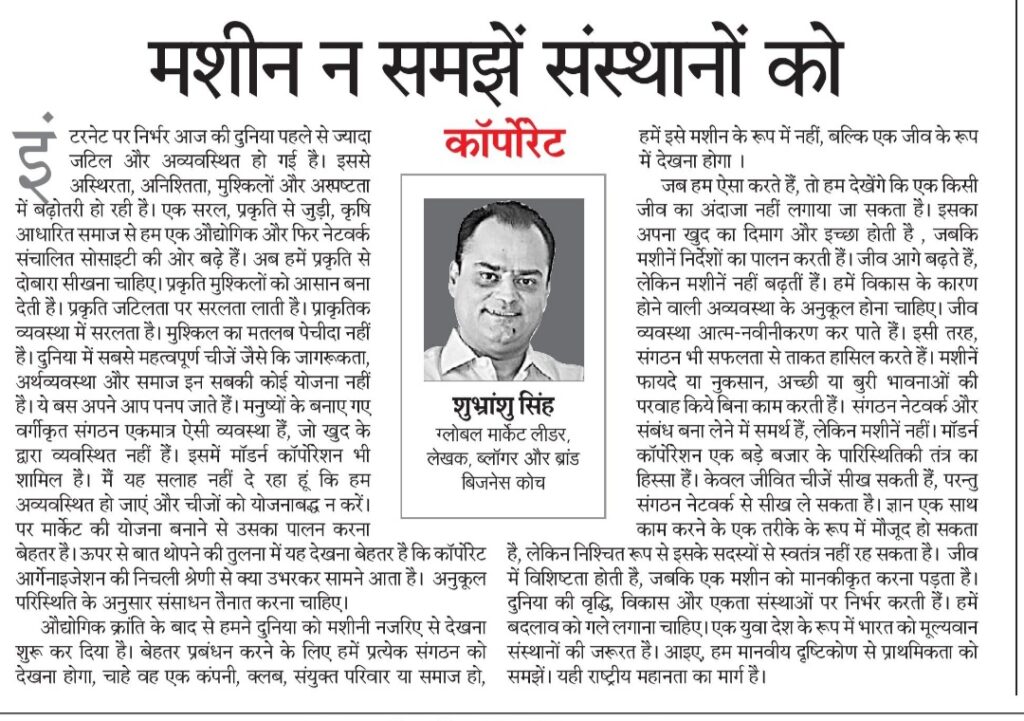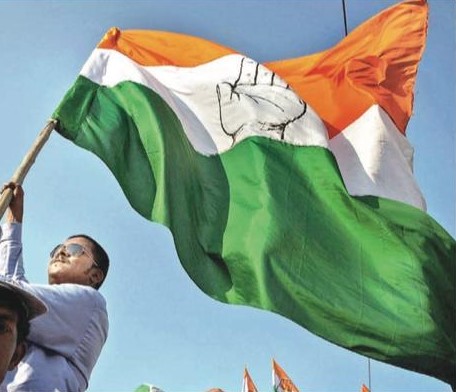दुनिया कोई मशीन नहीं बल्कि इसका एक अस्तित्व है
इंटरनेट पर निर्भर आज की दुनिया पहले से ज़्यादा जटिल और अव्यवस्थित हो गयी है। इससे अस्थिरता, अनिश्चितता, मुश्किलों और असपष्टता में बढ़ोतरी हो रही हैं। इनका सामना करना हमें मुश्किल लगता है । एक सरल, प्रकृति से जुड़ी, कृषि आधारित समाज से हम एक औद्योगिक और फिर नेटवर्क संचालित सोसाइटी की ओर बढ़े हैं. अब हमें प्रकृति से दोबारा सीखना चाहिए। प्रकृति मुश्किलों को आसान बना देती है, प्रकृति जटिलता पर सरलता लाती है। प्राकृतिक व्यवस्था में सरलता हैं। मुश्किल का मतलब पेचीदा नहीं है। दुनिया में सबसे महत्वपूर्ण चीजें – जैसे कि जागरूकता, अर्थव्यवस्था और समाज- इन सबकी कोई योजना नहीं है । ये बस अपने आप पनप जाते हैं ।मनुष्यों द्वारा बनाए गए वर्गीकृत संगठन एकमात्र व्यवस्था हैं जो खुद के द्वारा व्यवस्थित नहीं है । इसमें मॉडर्न कॉर्पोरेशन भी शामिल है। मैं यह सलाह नहीं दे रहा हूं कि हम अव्यवस्थित हो जाएं और चीजों को योजनाबद्ध न करें ।पर मार्किट की योजना बनाने से उसका पालन करना बेहतर है। ऊपर से बात थोपने की तुलना में यह देखना बेहतर है कि कॉर्पोरेट आर्गेनाइज़ेशन की निचली श्रेणी से क्या उभरकर सामने आता है । अनुकूल परिस्थिति के अनुसार संसाधन तैनात करना चाहिए । इंडस्ट्रियल रेवोलुशन के बाद से, हमने दुनिया को मैकेनिकल नज़रिए से देखना शुरू कर दिया है. बेहतर प्रबंधन करने के लिए, हमें प्रत्येक संगठन को देखना होगा — चाहे वह एक कंपनी, क्लब, संयुक्त परिवार या समाज हो- हमें इसे मशीन के रूप में नहीं बल्कि एक जीव के रूप में देखना होगा । जब हम ऐसा करते हैं, तो हम देखेंगे: [siteorigin_widget class=”SiteOrigin_Widget_Image_Widget”][/siteorigin_widget] एक लिविंग ऑर्गेनिज़म का अंदाजा नहीं लगाया जा सकता है। इसका अपना खुद का दिमाग और इच्छा होती है जब की मशीनें निर्देशों का पालन करती हैं. ऑर्गेनिज़म आगे बढ़ते हैं लेकिन मशीनें नहीं बढ़तीं हैं ।हमें विकास के कारण होने वाली अव्यवस्था के अनुकूल होना चाहिए । जीव व्यवस्था आत्म-नवीनीकरण कर पाते हैं इसी तरह, संगठन भी सफलता से ताकत हासिल करती हैं ।मशीनें फायदे या नुकसान, अच्छी या बुरी भावनाओं की परवाह किये बिना काम करती हैं । संगठन नेटवर्क और संबंध बना लेने में समर्थ हैं लेकिन मशीनें नहीं । मॉडर्न कॉर्पोरेशन एक बड़ी मार्किट के पारिस्थितिकी तंत्र का हिस्सा हैं । केवल जीवित चीजें सीख सकती हैं परन्तु संगठन नेटवर्क से सीख ले सकता हैं ।ज्ञान एक साथ काम करने के एक तरीके के रूप में मौजूद हो सकता है, लेकिन निश्चित रूप से इसके सदस्यों से स्वतंत्र नहीं रह सकता है। ऑर्गेनिज़म्स में विशिष्टता होती है जबकि एक मशीन को स्टैन्डर्डाइज़ करना पड़ता है. अगर किसी मशीन में उसके डिज़ाइन के अलावा अन्य विशेषताएं हैं, तो यह बहुत अच्छी मशीन नहीं है। युवा वयस्क और बूढ़ेऑर्गेनिज़म प्रत्येक अपने अनोखे चरित्र का प्रदर्शन करते हैं. इसी तरह विभिन्न चरणों के अन्दर ऑर्गेनाइज़ेशंस की अपनी संस्कृतियाँ हैं. दुनिया की वृद्धि, विकास और एकता लोगों द्वारा बनाई गई संस्थाओं पर निर्भर करती है. हमें निश्चित मशीनों के तरीकों से परे इसका सामना करना चाहिए ऐसा ज़रूरी नहीं है। लेकिन हमें बदलाव को गले लगाना चाहिए। एक युवा देश के रूप में भारत को मूल्यवान संस्थानों की ज़रूरत है । आइए हम मानवीय दृष्टिकोण से प्राथमिकता को समझें। यही राष्ट्रीय महानता का मार्ग है।










